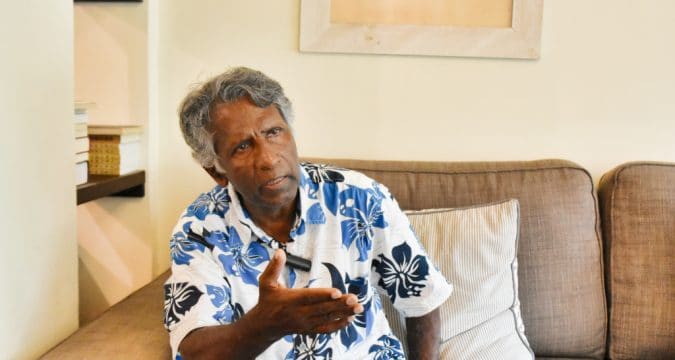

HONG KONG (SE): Jesuit Father Rajendram Christlin Parimalanathan, a dedicated promoter of nonviolent communication in Sri Lanka, said listening with empathy can be a way to help people to release frustrations caused by the extradition bill issues in Hong Kong this year.
Father Parimalanathan, a scholar in social communications, visited Hong Kong in August. In cooperation with Father John Baptist Kwan Kit-tong, Father Parimalanathan led a two-day retreat from August 16 to 17, followed by a talk on August 18 looking at how nonviolent communication and positive thinking can help people face the present political turmoil.
Speaking to the Kung Kao Po on August 19, Father Parimalanathan explained that nonviolent communication helps people to express their real needs and feelings instead of suppressing or ignoring them.
He emphasised that understanding people’s needs and feelings is a must for communication and can bring people together.
Addressing the political crisis caused by the extradition bill, Father Parimalanathan said many factors come into play in resolving such a major social issue. However, from his point of view, listening with empathy is important in reducing the tension among the different parties.
He pointed out that the anger of the protesters was caused by their feelings of being ignored by the government when they raised their demands.
They feel frustrated because they feel the government is not listening. Their strategy to express their feelings is to protest.
Father Parimalanathan said this anger can be appeased if there is a third party, such as non-government organisations or Church groups, who can listen to their needs and pains. He believes people can have more room to think about their strategies if they can calm down.
Moreover, he observes that the tension between people holding different opinions will only be heightened with more and more conflicts between the police and protesters. A third party or a listener can also help both sides to understand each other.
He pointed out that the anger of the protesters was caused by their feelings of being ignored by the government when they raised their demands
Marshall Rosenberg, who advocated nonviolent communication in 1960s, chose two animals to help convey his ideas: the jackal and the giraffe. They represent two kinds of communication.
The language of a jackal is judgmental and authoritarian, with the intention to control others and gain advantage.
On the other hand, the giraffe speaks in a gentle, simple but strong way. It is tall enough to look into the future. It communicates from its big heart, seeking connection with others, which is the basic principle of nonviolent communication.
Father Parimalanathan said babies or children tend to express themselves in the language of giraffes, that is, to directly cry for food and smile when they are full. But when they grow up, they have learned to express hunger in other ways. For example, they will not say they are hungry, but will blame others for not preparing food on the table.
Father Parimalanathan was born in Sri Lanka in 1943 and joined the Jesuits in the 1960s. He was ordained in 1973. As civil war broke out in Sri Lanka in 1980s, he lived with 20 orphans who lost their parents in military conflicts.
The children lived with him until they graduated from secondary school. The priest said he learned a lot while communicating with them. He believes it is easier for children to communicate in a nonviolent way, as they are more likely to open up.
As a lecturer in social communications in university, Father Parimalanathan has also set up programmes on nonviolent communication to help solve the conflicts in university.
He said many people know the importance of love, but do not know how to live it out. So he organises workshops for students to learn how to communicate in nonviolent ways and show them how to turn criticisms into observations.










